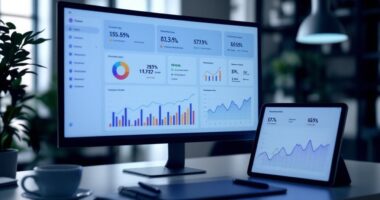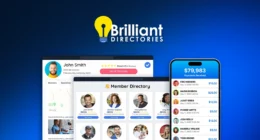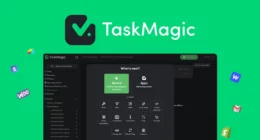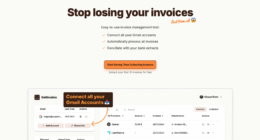Small business tax software streamlines financial compliance through automated calculations, error checking, and seamless integration with existing accounting systems. Popular budget-friendly options include TaxCloud, TaxAct, and QuickBooks Sales Tax, offering features like cloud storage, multi-state filing support, and automatic updates for tax regulations. Key selection criteria include matching software capabilities to business type, pricing tiers, and integration options. The right tax software platform can transform time-consuming manual processes into efficient, automated workflows, with benefits extending far beyond basic compliance.
Quick Overview
- Choose tax software that matches your business type and integrates with existing accounting systems for seamless data flow.
- Look for automated calculations, compliance checks, and built-in error detection to ensure accurate tax filing and reporting.
- Consider budget-friendly options like TaxCloud or TaxAct, which offer essential features without breaking the bank.
- Ensure the software provides regular updates for tax law changes and supports both federal and state filing requirements.
- Select cloud-based solutions that offer secure data storage and accessibility from anywhere while maintaining compliance standards.
Understanding Small Business Tax Software Requirements

When small businesses begin exploring tax software solutions, understanding their core requirements becomes essential for making an informed decision. Key software features should include automated calculations, compliance checks, and integration capabilities with existing accounting systems. Federal and state filing support with relevant deadlines is crucial for comprehensive tax management.
The software must offer extensive guidance through tax processes while ensuring accuracy in filing. Tax accuracy guarantees can provide additional peace of mind for business owners concerned about compliance. Important requirements include built-in compliance checks to flag potential errors, automatic updates for current tax regulations, and tools for maximizing deductions.
Small businesses should look for software that provides:
- Step-by-step guidance through complex tax procedures
- Integration with accounting and POS systems
- Multi-user access for team collaboration
- Strong data security measures
- Support features like live assistance
- Compatibility with various business entity types
- User-friendly interface for staff with limited tax expertise
Top Tax Software Solutions for Budget-Conscious Businesses
Several affordable tax software solutions exist for small businesses seeking to manage their tax obligations without straining their budgets.
TaxCloud stands out with its free sales tax calculations and low-cost filing options, making it particularly attractive for startups.
TaxCloud's free calculations and budget-friendly filing make it an ideal tax solution for emerging businesses and startups.
TaxAct delivers cost-effective solutions with a user-friendly interface, while providing valuable features like cloud storage and year-round planning tools.
For businesses already using specific accounting platforms, integrated solutions offer additional savings. Stripe Tax offers a flexible pay-as-you-go model that helps businesses control costs based on their transaction volume.
QuickBooks Sales Tax seamlessly connects with existing QuickBooks systems, eliminating costly setup processes.
Similarly, Xero Tax provides native integration with Xero's accounting platform, streamlining tax calculations and reducing operational complexity.
These integrated options help budget-conscious businesses maximize efficiency while maintaining accurate tax compliance.
Essential Features to Look for in Tax Software
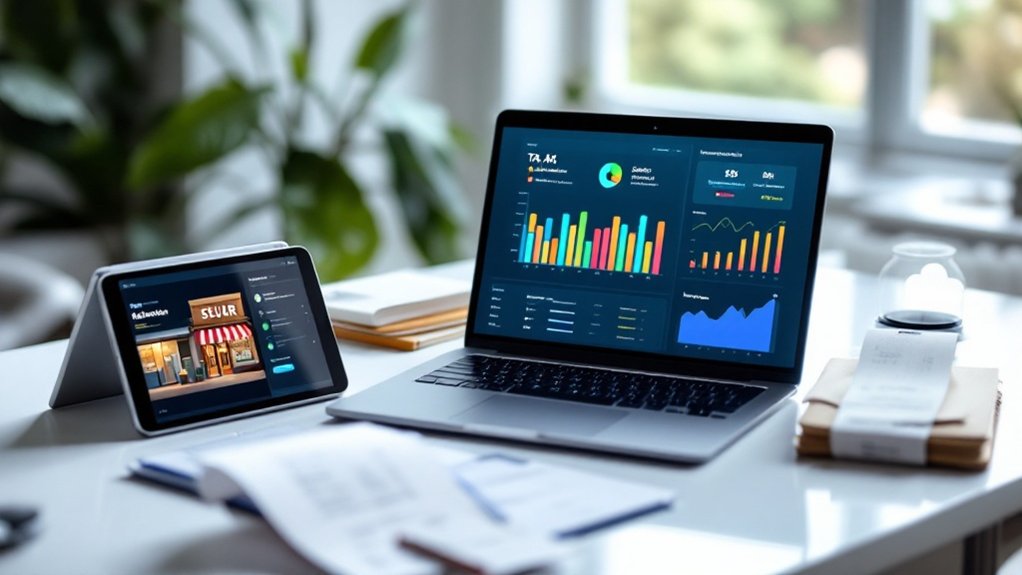
Selecting the right tax software requires careful evaluation of essential features that can make or break a small business's tax management process. Key capabilities should include seamless integration with accounting systems, POS solutions, and e-commerce platforms to minimize manual data entry. Cloud-based solutions provide secure data storage and accessibility from anywhere.
The software must offer robust tax calculation features, including automated computations, real-time rate updates, and multi-state filing support.
User experience is equally important, with an intuitive interface and thorough training resources. Strong data management and security features should protect sensitive financial information while providing real-time analysis.
Look for compliance-focused features like automatic error detection, audit defense, and regular tax law updates. These elements help prevent costly mistakes and guarantee accurate filings, making tax season more manageable for small business owners.
How to Choose the Right Tax Software Platform
After understanding the key features needed in tax software, small business owners must focus on making an informed choice among available platforms. The selection process should begin with evaluating the business's structure and guaranteeing the software supports necessary forms and schedules.
To make the right choice, businesses should:
- Match software capabilities to their entity type (sole proprietorship, LLC, etc.)
- Compare pricing tiers against needed features
- Verify integration with existing accounting systems
- Ensure adequate customer support options
- Check for user-friendly interfaces and guided assistance
Additionally, consider scalability for future growth and confirm the platform offers strong security measures.
Look for software that provides automatic updates to tax regulations and maintains compatibility with essential business tools like payroll systems and e-commerce platforms. Leading platforms like H&R Block offer comprehensive support for multiple business entities including partnerships, corporations, and sole proprietorships.
Maximizing Tax Software Benefits for Your Business
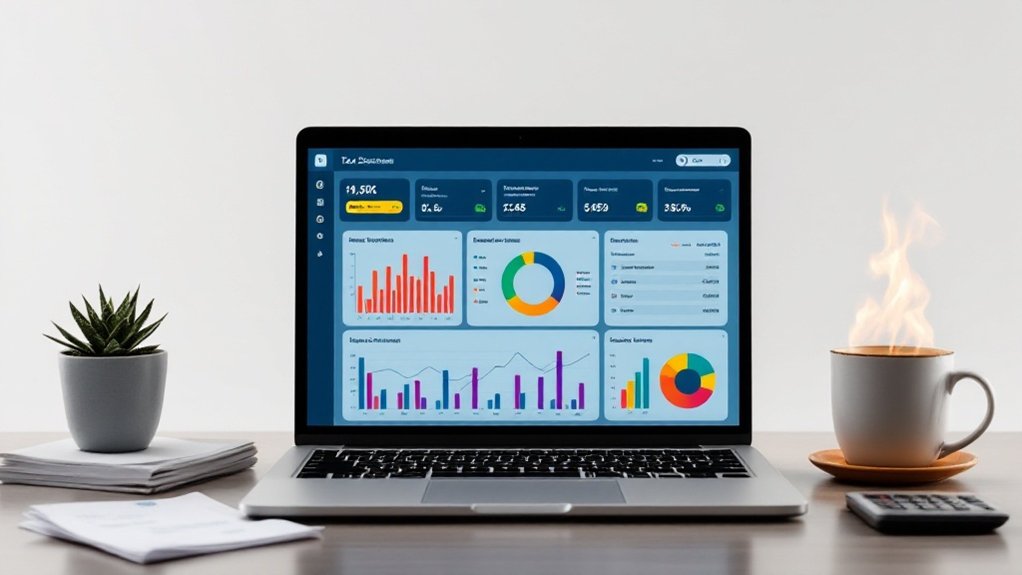
Once businesses invest in tax software, maximizing its full potential becomes crucial for achieving ideal returns on investment. To optimize benefits, companies should focus on three key areas: automation, accuracy, and resource utilization.
First, enable all automated features, including expense tracking and categorization, to reduce manual data entry and save valuable time. The software's ability to minimize human errors through automated calculations ensures more reliable results than manual methods. Tools like tax scenario analysis can help businesses develop optimal strategies for maximum savings.
Next, leverage the software's error-checking capabilities and automatic updates to guarantee compliance with current tax regulations. This prevents costly mistakes and minimizes audit risks.
Finally, take advantage of built-in support resources. Use training materials to educate staff, access professional assistance for complex issues, and utilize the software's deduction-finding tools.
Many platforms offer video tutorials and extensive help centers that can transform novice users into confident operators, maximizing the software's value for the business.
Integrating Tax Software With Your Existing Systems
Modern businesses achieve the greatest value from tax software when it works harmoniously with their existing business systems. Integration capabilities span across multiple essential platforms, including accounting systems, e-commerce solutions, POS systems, and payment processors.
Key integration benefits include:
Integrating tax software with core business systems delivers essential benefits for streamlined operations and improved accuracy.
- Automated data synchronization with accounting platforms like QuickBooks
- Real-time tax calculations for online stores through e-commerce connections
- Location-based tax rates via POS system integration
- Streamlined tax filing through payment processor links
These integrations create a seamless workflow that reduces errors and saves time. Leading providers like Zamp and Avalara offer comprehensive API integrations to facilitate smooth system connections.
While technical complexity can present initial challenges, the long-term benefits make integration worthwhile. Businesses can maintain accurate records, guarantee compliance, and greatly reduce manual data entry through proper system connections.
Frequently Asked Questions
How Long Should I Keep Digital Tax Records After Filing Through Software?
The IRS recommends keeping digital tax records for at least three years after filing, though certain situations require longer retention.
Records should be kept for six years if 25% or more of gross income went unreported.
For fraudulent returns or unfiled taxes, records must be kept indefinitely.
Asset-related documents should be maintained until the statute of limitations expires after their sale.
State requirements may vary, so checking local regulations is advisable.
Can Multiple Users Access the Tax Software Simultaneously From Different Locations?
Yes, multiple users can access tax software simultaneously from different locations, particularly with cloud-based solutions.
Modern tax platforms like CCH Axcess Tax and QuickBooks Online are specifically designed for multi-user access.
However, some limitations apply: proper licensing is required for each user, certain desktop versions may restrict simultaneous access, and some platforms cap the number of concurrent users.
Cloud-based options typically offer the most flexibility for remote team collaboration.
What Happens if the Tax Software Crashes During Filing?
If tax software crashes during filing, users should immediately take several key steps.
First, they should document the exact time and nature of the crash. Screenshots and error messages can serve as evidence.
The software typically saves data automatically, allowing users to recover their progress.
Users should contact the software provider's support team and may need to request proof of the crash for IRS documentation.
In some cases, the IRS may grant filing extensions due to technical difficulties.
Are Software-Generated Tax Documents Legally Valid in Case of Audits?
While some might worry that computer-generated documents lack the gravitas of handwritten ledgers, software-generated tax documents are fully legitimate for IRS audits.
Under Section 6001 of the Internal Revenue Code and Revenue Procedure 98-25, electronic records have the same legal standing as paper documents. The IRS actually prefers digital records because they maintain metadata integrity and allow for more efficient examination.
However, businesses must verify their software meets IRS compatibility requirements.
Can I Switch Between Different Tax Software Platforms Mid-Year?
Yes, switching between tax software platforms mid-year is possible, though it requires careful planning.
The change process typically involves exporting data from the old system and importing it into the new one.
Key considerations include:
- Timing the switch during non-peak periods
- Ensuring complete data transfer
- Training staff on the new system
- Verifying data accuracy post-transfer
While feasible, businesses should weigh the benefits against potential disruptions and implement the change strategically to maintain smooth operations.
Conclusion
A staggering 89% of small businesses that use tax software report fewer filing errors compared to manual preparation. The right tax software solution can transform a business's financial management, saving both time and money while ensuring compliance. By carefully evaluating options, implementing appropriate features, and maintaining proper integration with existing systems, small businesses can streamline their tax processes and focus on what matters most – growing their enterprise.


